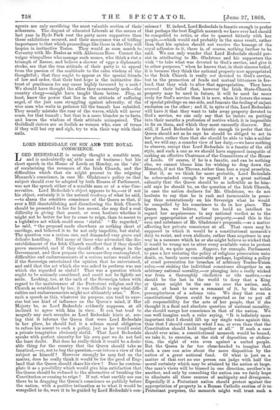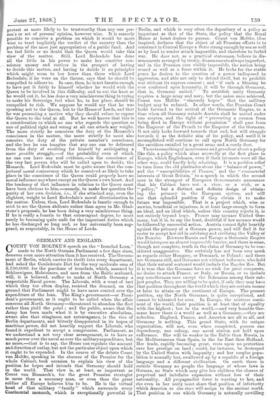LORD REDESDALE ON SIN AND THE ROYAL CONSCIENCE.
LORD REDESD ALE is usually thought a sensible man, and is undoubtedly an able man of business ; but his short speech in the House of Lords on Monday, on the sin' of secularizing the revenues of the Irish Church, and the difficulties which that sin might present to the reigning Monarch's conscience, in case Mr. Gladstone's policy on that subject should ever be adopted by both Houses of Parliament, was not the speech either of a sensible man or of a wise Con- servative. Lord Redesdale's object appears to be,—or if not his object, certainly it is the natural tendency of what he said, —to alarm the sensitive conscience of the Queen so that, if ever a Bill disestablishing and disendowing the Irish Church should be presented to her for her assent, she may find a real difficulty in giving that assent, or even hesitate whether it might not be better for her to cease to reign, than to assent to a legislative act which could seem sinful.' " He regarded," he said, " the proposal made elsewhere as nothing short of sacrilege, and believed it to be not only impolitic, but sinful. The question was a serious one, and demanded very grave and delicate handling. Did many of those who advocated the dis- establishment of the Irish Church recollect that if they should prove successful, and if they should effect a change in the Government, and then propose the measure they contemplated, difficulties and embarrassments of a serious nature would arise if the Sovereign entertained the opinion that he entertained, and said that the act which she was asked to perform was one which she regarded as sinful ? That was a question which ought to be seriously considered, and could not be lightly set aside. Looking, too, at the oath of the Sovereign taken with regard to the maintenance of the Protestant religion and the Church as established by law, it was difficult to say what diffi- culties and embarrassments might not ultimately arise." Now, such a speech as this, whatever its purpose, can tend to exer- cise but one kind of influence on the Queen's mind, if Her Majesty be, as Lord Redesdale evidently supposes, at all inclined to agree with him in view. It can but tend to magnify any such scruples as Lord Redesdale hints at, see- ing that it informs the Queen that were Lord Redesdale in her place, he should feel it a solemn moral obligation to refuse his assent to such a policy, just as he would resist a private temptation obviously sinful. That Lord Redesdale speaks with perfect sincerity for his own part we do not feel the least doubt. But does he really think it would be a desir- able thing for the country that the Queen should take as fanatical,—or, not to beg the question,—as intense a view of the subject as himself ? However strongly he may feel on the matter, does he really think it would be for the good of Eng- land that the Queen should share his view ? Does he contem- plate it as a possibility which would give him satisfaction that the Queen should be reduced to the alternative of breaking the Constitution or ceasing to reign ? If not, what earthly use can there be in dragging the Queen's conscience so publicly before the nation, with a positive intimation as to what it would be compelled to do, were it to be guided by Lord Redesdale's con- science ? If, indeed, Lord Redesdale is fanatic enough to prefer that perhaps the best English monarch we have ever had should be compelled to retire, or else to quarrel bitterly with her people,—which would end probably in the same result, rather than that his opinion should not receive the homage of the- royal adhesion to it, there is, of course, nothing further to be- said. We can only wonder that Lord Redesdale should per- sist in attributing to Mr. Gladstone and his supporters the- wish " to take what was devoted to God's service, and give it to other purposes," when he knows that, in their sincere belief„. it is because they think the national property now appropriated to the Irish Church is really not devoted to God's service, but to the promotion of feuds and mutual bitterness in Ire- land, that they wish to alter that appropriation. They have- avowed their belief that, however the Irish State-Church property may be used in future, it will be used far more- truly for God's service than it is now, when it fosters the sense- of special privilege on one side, and foments the feeling of unjust exclusion on the other ; and if, in spite of this, Lord Redesdale will have it that they want to take away property devoted ta- God's service, we can only say that he insists on putting into their mouths a profession of motive which it is impossible to fix on them, and which they most earnestly disavow. Bat still, if Lord Redesdale is fanatic enough to prefer that the- Queen should act as he says he should be obliged to act in> her place, rather than that she should be able to take a milder and, we will say, a sounder view of her duty,—we have nothing to observe, except that Lord Redesdale is a fanatic of the old, style, and such a one as we should have supposed incapable of making an effective Chairman of the Committees of the House of Lords. Of course, if he is a fanatic, and can be nothing else, we cannot blame him for wishing to drag down the' Monarch, if not the Throne, rather than lose a royal proselyte..
But if, as we think far more probable, Lord Redesdale- be sober-minded enough to regard it as a great national calamity that the Queen should be as inflexible as he him- self says he should be, on the question of the Irish Church, in case the nation declares for Mr. Gladstone, we do not hesitate to say that he is rash and inexcusable in press- ing thus ostentatiously on his Sovereign what he would be compelled by his conscience to do in her place. The- Queen has, we believe, far too lucid an intellect to• regard her acquiescence in any national verdict as to the proper appropriation of national property,—and this is the- sum and substance of Mr. Gladstone's proposals,—as a matter affecting her private conscience at all. That cases may be supposed in which it would be a constitutional monarch's duty to resist, and even abdicate, rather than acquiesce in any way in a measure which he or she might believe so wicked that it would be wrong not to utter every available voice in protest against it, we quite agree. Suppose, for example, Parliament to pass a law restoring the policy of religious persecution unto- death, or, barely more conceivable perhaps, legalizing a policy of cruel persecution for breaches of arbitrary Trades-Union rules,—or sinking the individual conscience altogether in an. arbitrary national morality,—or plunging into a really wicked war from a thoroughly vindictive or vile motive,—we- should be the last in the world to deny that a King or Queen might be the one to save the nation, and, if not, at least to save a remnant of it, by the noble- peremptoriness of a solemn veto. We deny that even a constitutional Queen could be expected so far to put off all responsibility for the acts of her people, that if she thought it a final and absolute question of national morality, she should merge her conscience in that of the nation. We can well imagine such a ruler saying, "It is infinitely more- important that I should lift up my single voice against this, than that I should continue what I am, or even than that the- Constitution should hold together at all." If such a case should ever arise, a constitutional monarch would be bound, we take it, to exercise, at the risk of deposition or abdica- tion, the right of veto even against a united people. But the Queen is far too clear-headed to imagine that such a case can arise about the mere disposition by the
nation of a great national fund. Of what is just on a matter of that sort no one person can judge with half the- moral certainty which may be attained by the nation at large.. One man's views will be biassed in one direction, another's in another, and only by consulting the nation can we fairly hope- to eliminate all these sources of ambiguity and divergence. Especially if a Protestant nation should protest against the- appropriation of property in a Roman Catholic section of it to- Protestant purposes, the monarch might well trust such a. protest as more likely to be trustworthy than any one per- son's or set of persons opinion, however wise. It is scarcely possible to conceive a problem on which it would be more wise to trust implicitly the verdict of the country than the problem of the most just appropriation of a public fund. And we feel little or no doubt that the Queen would take this view of the matter. Still, Lord Redesdale has done all the little in his power to make her sensitive con-
,-, science uneasy and restless in the prospect of having to decide this matter, and having to decide it on principles which might seem to her lower than those which Lord Redesdale, if he were on the throne, says that he should be compelled to adhere to. In case, then, he is not fanatic enough to have put it fairly to himself whether he would wish the Queen to be involved in this difficulty, and to out the knot as he would cut it, he has done a very mischievous thing in trying to make his Sovereign feel what he, in her place, should be compelled to risk. We suppose he would say that he was speaking not to the Queen, but to the House of Lords, and that he was presenting a motive why they should refuse to expose the Queen to the trial at all. But he well knows that this is a consideration to which no one who regards the question as one of political right and wrong at all can attach any weight. The more strictly he conceives the duty of the Monarch's conscience in the matter, the more strictly he must also conceive the duty of the private member's conscience, and the less he can imagine that any one can be delivered from the duty of resolving for himself by anticipating a mere possible struggle,—of the probability even of which no one can have any real evidence,—in the conscience of the very last person who will be called upon to decide, the Monarch. Lord Redesdale must be quite aware that the con- jectural moral controversy which he conceived as likely to take place in the conscience of the Queen could properly have no moral influence anywhere except on the Queen's own heart. And the tendency of that influence in relation to the Queen must have been obvious to him,—namely, to make her question the purity of her own decision, i.e., if she attached any, even the slightest, weight to Lord Redesdale's moral discrimination in the matter. Unless, then, Lord Redesdale is fanatic enough to wish to see the Queen abdicate rather than agree to Mr. Glad- stone's proposals, he has been doing a very mischievous thing. If he is really a fanatic to that extravagant degree, he must surely be becoming quite unfit for the important duties which he has discharged so long and, as has universally been sup- posed, so respectably, in the House of Lords.































 Previous page
Previous page